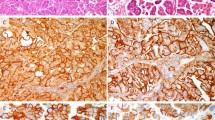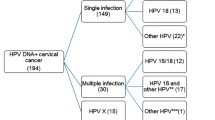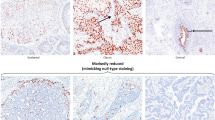Abstract
p53 gene aberrations are common in human malignancies, and recent studies suggest that in cervical carcinoma p53 function is inactivated either by complex formation with human papillomavirus (HPV) E6 product or by gene mutation. Using polymerase chain reaction (PCR) followed by denaturing gradient gel electrophoresis (DGGE), we examined the mutational status of the four 'hotspot' regions of the p53 gene in 47 primary cervical carcinomas. HPV status was determined, also by PCR. In 20 of these cases, we examined for loss of heterozygosity (LOH) on chromosome 17p13. In the 47 carcinomas, and in a further 68 biopsy specimens from normal, premalignant and malignant cervix, we investigated aberrant immunocytochemical expression of p53. Immunocytochemically, abnormal p53 expression was detected in 13 of 115 cases (8/57 carcinomas). Somatic mutation in p53 was detected in 1 of 47 cervical carcinomas; 36 were positive for HPV 16, 18 or 33. A low level of allele loss (3 out of 20 cases) was detected on chromosome 17p, occurring in both HPV-positive and HPV-negative cases, and in cases with and without p53 mutations. We conclude that somatic mutation in the hotspot regions of the p53 gene occurs infrequently in cervical carcinomas; that immunocytochemically detectable levels of p53 are also infrequent; and that there is no consistent correlation between p53 mutational status, LOH on chromosome 17p or HPV status in these cancers.
This is a preview of subscription content, access via your institution
Access options
Subscribe to this journal
Receive 24 print issues and online access
$259.00 per year
only $10.79 per issue
Buy this article
- Purchase on Springer Link
- Instant access to full article PDF
Prices may be subject to local taxes which are calculated during checkout
Similar content being viewed by others
Author information
Authors and Affiliations
Rights and permissions
About this article
Cite this article
Busby-Earle, R., Steel, C., Williams, A. et al. p53 mutations in cervical carcinogenesis – low frequency and lack of correlation with human papillomavirus status. Br J Cancer 69, 732–737 (1994). https://doi.org/10.1038/bjc.1994.138
Issue Date:
DOI: https://doi.org/10.1038/bjc.1994.138
This article is cited by
-
Comprehensive Data of P53 R282 Gene Mutation with Human Papillomaviruses (HPV)-Associated Oral Squamous Cell Carcinoma (OSCC)
Pathology & Oncology Research (2020)
-
The Role of p53 Gene in Cervical Carcinogenesis
The Journal of Obstetrics and Gynecology of India (2016)
-
Cytogenetic significance of chromosome 17 aberrations and P53 gene mutations as prognostic markers in oral squamous cell carcinoma
Diagnostic Pathology (2015)
-
The bone morphogenetic protein antagonist gremlin 1 is overexpressed in human cancers and interacts with YWHAH protein
BMC Cancer (2006)
-
HPV subtypes in cervical cancer biopsies between 1930and 2004: detection using general primer pair PCR and sequencing
Virchows Archiv (2006)



